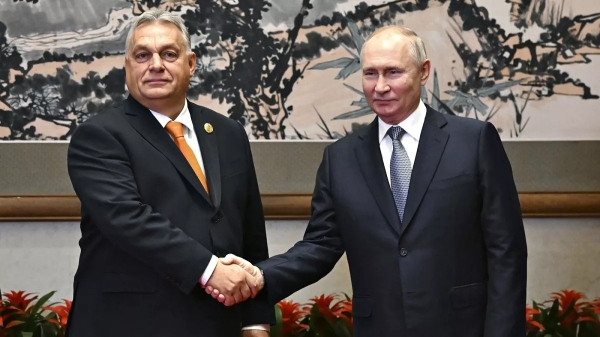Hungary Becomes First EU Country to Congratulate Putin for Winning the ‘Elections’
Hungarian Prime Minister Viktor Orban’s congratulatory message to Russian President Vladimir Putin on his “re-election” has sent shockwaves through the European Union, amplifying concerns about political unity and Orban’s alignment with Moscow’s authoritarian regime.
In his message to Putin, Orban emphasized the significance of cooperation between Hungary and Russia, citing mutual respect as the foundation for dialogue even amid complex geopolitical challenges. Orban’s affirmation of Hungary’s commitment to peace and willingness to expand cooperation within the boundaries of international law has sparked outrage among EU leaders and raised questions about Hungary’s loyalty to EU and NATO alliances.
The timing of Orban’s congratulatory note, coinciding with a crucial EU summit focused on strengthening military support for Ukraine and bolstering the bloc’s defense capabilities, has been viewed as a deliberate affront to EU solidarity. Orban’s gesture stands in stark contrast to the unified stance adopted by other European leaders, who have condemned Russia’s electoral process as undemocratic and marred by human rights violations.
European Parliament President Roberta Metsola rebuked Orban’s actions, emphasizing the need to uphold democratic principles and condemn Russia’s disregard for electoral integrity. Metsola’s condemnation reflects broader concerns within the EU about Orban’s alignment with Putin’s regime and Hungary’s drift away from EU values.
Estonian Prime Minister Kaja Kallas echoed Metsola’s sentiments, denouncing Putin’s “special nomination operation” as a sham election lacking legitimacy. Kallas warned against normalizing Putin’s authoritarian rule and urged EU leaders to stand firm against Russian aggression and human rights abuses.
Orban’s history of exploiting his veto power within the EU to advance his own agenda has fueled skepticism among EU allies about Hungary’s commitment to collective security efforts. Orban’s strategic maneuvering, often likened to Russian dolls, has exacerbated tensions within the bloc and strained Hungary’s relations with its EU counterparts.
Critics of Orban’s congratulatory message argue that it undermines efforts to hold Russia accountable for its actions in Ukraine and signals tacit approval of Putin’s autocratic leadership. Orban’s willingness to align himself with Putin’s regime has raised alarm bells about Hungary’s adherence to democratic values and its role within the EU and NATO.
Meanwhile, Putin’s victory has drawn condemnation from Western leaders, who have accused Russia of electoral fraud and human rights violations. The absence of widespread congratulations from EU countries underscores the growing skepticism toward Russia’s democratic credentials and underscores the challenges facing European-Russian relations in the post-election landscape.
Orban’s unwavering support for Putin has cast a shadow over Hungary’s standing within the EU, raising concerns about the country’s commitment to EU values and collective security efforts. As EU leaders grapple with the fallout from Putin’s “re-election,” Orban’s actions have reignited debates about Hungary’s place in the European project and its relationship with Moscow.






